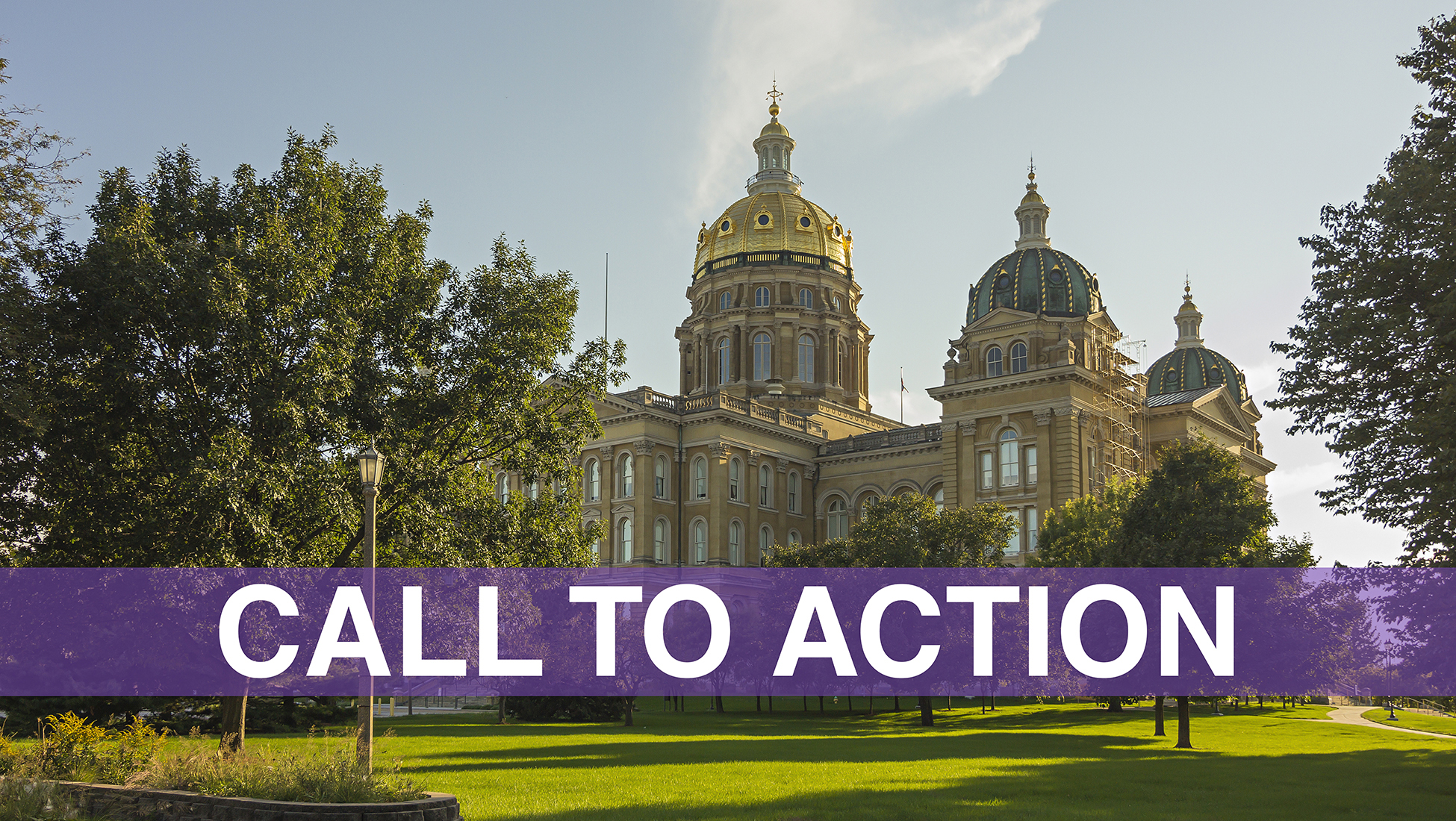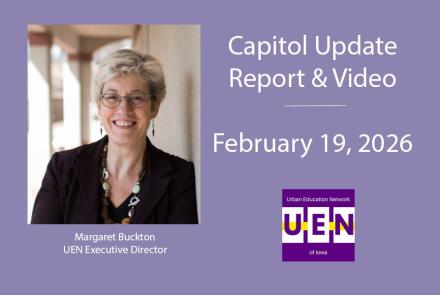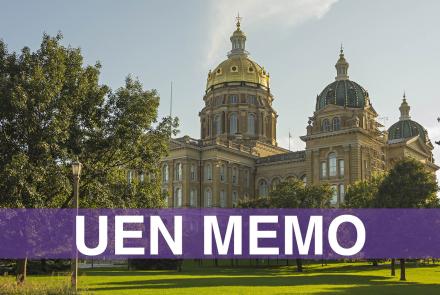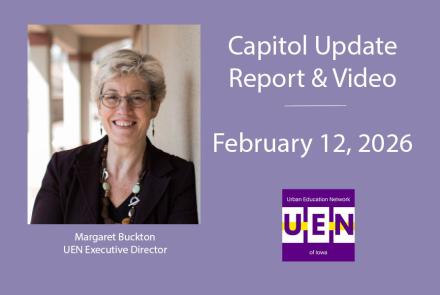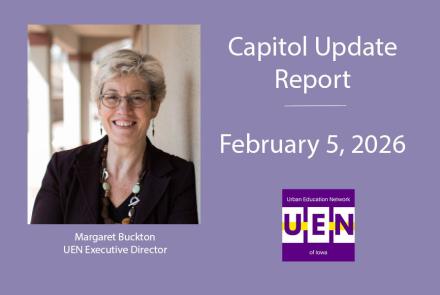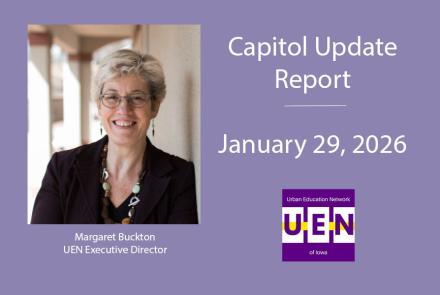Call to Action Update on Governor's School Choice Omnibus Bill
CALL TO ACTION UPDATE
Education Savings Accounts (Vouchers), Charter Schools and
Diversity Plans/Open Enrollment Bills Are Not for Iowa
Feb 5, 2021
Update Feb. 5: Diversity plans HF 228 was approved by the House and sent over to the Senate. This indicates the House’s intent to work on provisions of the bill separately. It will take longer but allow advocates to continue connecting with their legislators about concerns. Keep discussing vouchers with House members in particular this week. Use the new information below to continue conversations.
Download the full February 5, 2021 Call to Action
See the Jan. 28 Call to Action Update for details about SF 159 all provisions after consideration in the Senate. When considering any shift to privatization, Other Initiatives Deliver Better Results: Stanford Economist Professor Martin Carnoy studies the effectiveness of educational interventions. "There are many policy changes that are likely to have much higher payoffs than privatization including teacher training, early childhood education, after-school and summer programs, student health programs, and heightened standards in math, reading, and science."
New This Week: Cost of Vouchers to the Public School Talking Points on Charter Schools
|
School district funds lost per voucher $7,048 regular program $1,100 per pupil supplements $ 350 dropout prevention authority $ 538 Instructional Support Authority $9,036 per pupil lost revenue Additionally, weightings, SAVE and federal funds are also tied to enrollment. |
Charter Schools: SF 159 includes two kinds of charter schools. We support the first and opposed the second:
- Chartered by school board – still lots of provision to meet, but theory is exchange of flexibility through State Board of Education waiver of regulations for focused accountability
- for student achievement. This allows a flexible approach to a targeted learning program such as STEM (Science, Technology, Engineering and Math) or STEAM (STEM + Arts), or a College Prep Program for first generation college goers, like Storm Lake’s existing public charter school. This approach is OK and should proceed first. The locally elected school board is in charge of the charter, the contracts, transparent fiscal responsibility and accountability for student outcomes. The school board could convert an existing attendance center to a chart school or create a new charter school.
- Chartered by an outside entity – this method allows outside entities to establish charter schools within the boundaries of a school district without the permission or consent of the school board. This could be disgruntled community members if an attendance center needs to close for budgetary purposes, or due to pushback on attendance center boundaries changed for equity purposes. Universities, businesses, chartering companies, nonprofits and community groups could form charters and could work with businesses that establish charter schools to meet all of the start-up provisions.
Concerns with Charter Schools charters by an outside entity:
- Charter Schools from Outsiders is not a good fit for Iowa: Iowa schools and communities are good at collaborating. We will collectively find the answers to meet the needs of students if state regulations can get out of our way. Charter schools created by outside entities, often for-profit businesses, can create rifts in local communities and draw capacity (staff and students) away from schools facing budget pressures.
- Charter Schools Increase Property Taxes: Charter schools have a mixed bag of results and many close. SF 159 allows school boards to request spending authority from the SBRC for the opening/closing of a charter school. Spending authority is funded by Property Taxes. Also, the potential to double count students would increase property taxes. The fiscal note states:
“There is a potential for double counting of students for State funding. For the initial year of funding for a charter school, State funding is based on an estimate of enrolled students. The potential students included in the charter school estimate may not actually attend the charter school and would in turn be funded at the school where the student is actually enrolled.”
Charters close or never open due to low enrollment: As reported in Forbes Sept. 2018: The Center for Media and Democracy found that (nationally) about 2,500 charter schools closed between 2000 and 2013. Some of them closed at the end of the school year, some never opened in the first place, and some closed abruptly in the middle of the year. Charters can close for a variety reasons; this week's closings appear to be due to financial problems because of low enrollment.
- Economy of Scale for Rural Schools: Rural schools already suffer from scarcity of students and staff shortages. Instead of creating the competition for scarce students and staff in rural areas, incentives should exist to become more efficient through increase sharing and collaboration with other entities.
- All Schools Need Support: Financial support and flexibility to address staff shortages, in addition to additional waivers from state regulations, will help all schools and communities find creative solutions to providing students with great learning experiences, work-based learning, STEM and STEAM programs, college prep, computer science focused, or career and technical.
|
To call and leave a message at the statehouse during Session, the House switchboard operator number is 515.281.3221. You can ask if they are available, leave a message for them to call you back, or leave a short message to “oppose any school voucher proposal.” Legislators are typically back home over the weekend.
|
House Members
The following links will take you to each Representative’s legislative page, with email address and often home or cell phone number so you can easily connect with them. Continue to contact House members, especially House Republicans, asking for a NO vote on Vouchers if there was a bill just addressing that provision. Let us know what responses you get back. Remember to be respectful and explain the impact these provisions would have on your school and education for your students.
|
House Republican Name and Link to Info |
County of Residence |
Email address |
|
Polk |
||
|
Story |
||
|
Hancock |
||
|
Winneshiek |
||
|
Carroll |
||
|
Worth |
||
|
Warren |
||
|
Woodbury |
||
|
Jones |
||
|
Mahaska |
||
|
Cherokee |
||
|
Muscatine |
||
|
Story |
||
|
Ringgold |
||
|
Tama |
||
|
Clarke |
||
|
Benton |
||
|
Polk |
||
|
Lee |
||
|
Butler |
||
|
Madison |
||
|
Jones |
||
|
Mahaska |
||
|
Crawford |
||
|
Fayette |
||
|
Pottawattamie |
||
|
Plymouth |
||
|
Clay |
||
|
Cedar |
||
|
Louisa |
||
|
Washington |
||
|
Polk |
||
|
Franklin |
||
|
Polk |
||
|
Dubuque |
||
|
Poweshiek |
||
|
Linn |
||
|
Webster |
||
|
Henry |
||
|
Scott |
||
|
Clinton |
||
|
Cass |
||
|
Dallas |
||
|
Clayton |
||
|
Scott |
||
|
Black Hawk |
||
|
Calhoun |
||
|
Van Buren |
||
|
Mills |
||
|
Pottawattamie |
||
|
Adair |
||
|
Winnebago |
||
|
Greene |
||
|
Marion |
||
|
Wapello |
||
|
Sioux |
||
|
Dickinson |
||
|
Harrison |
||
|
Buena Vista |


